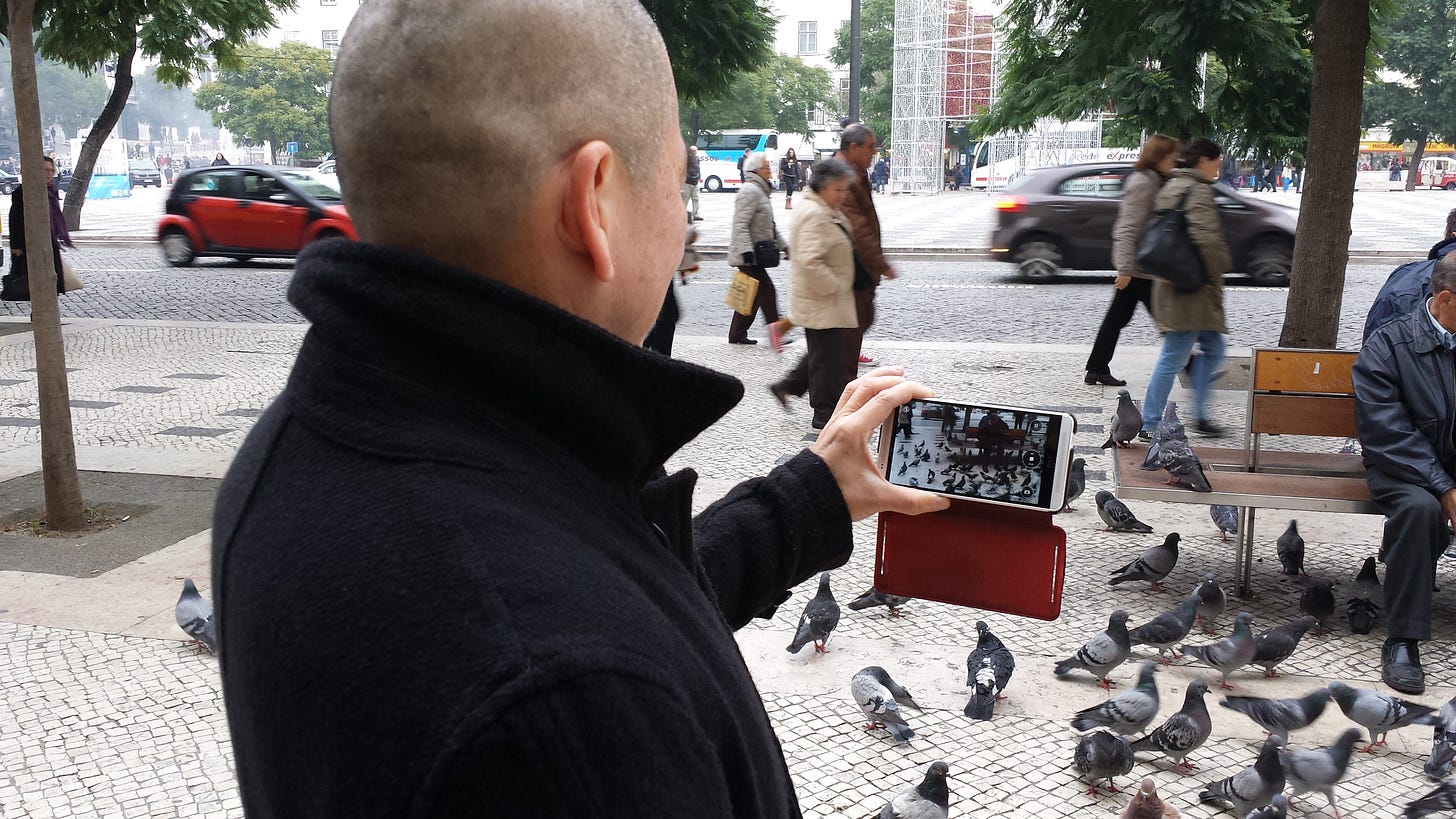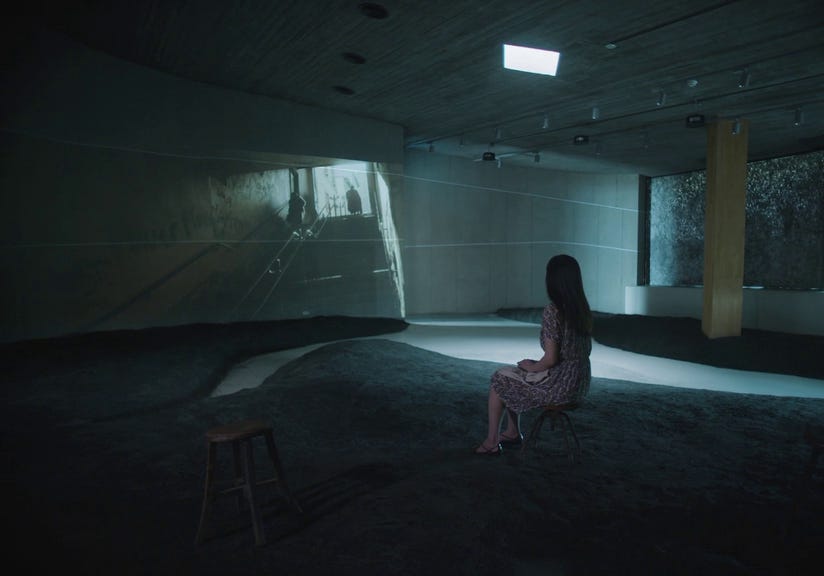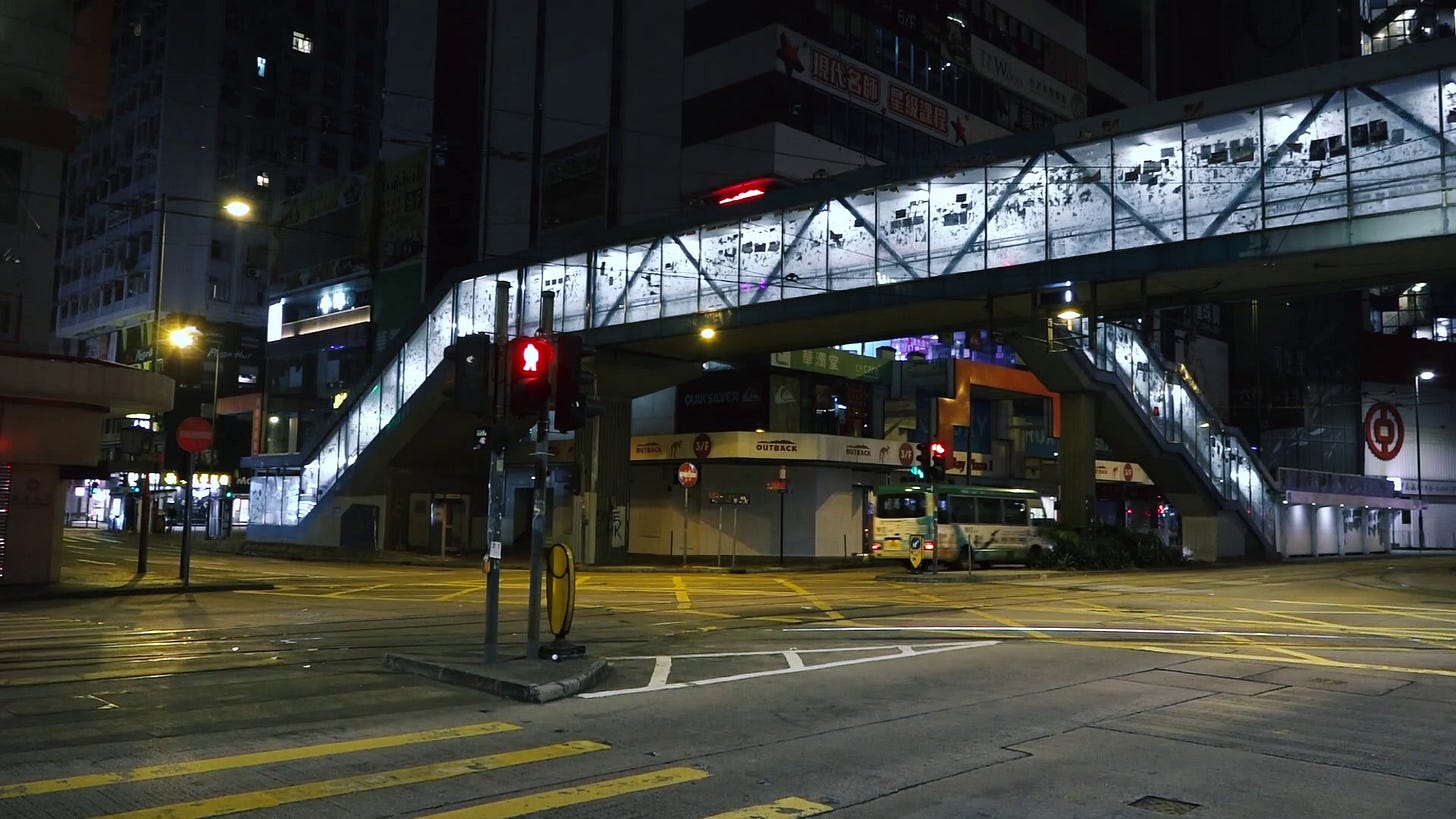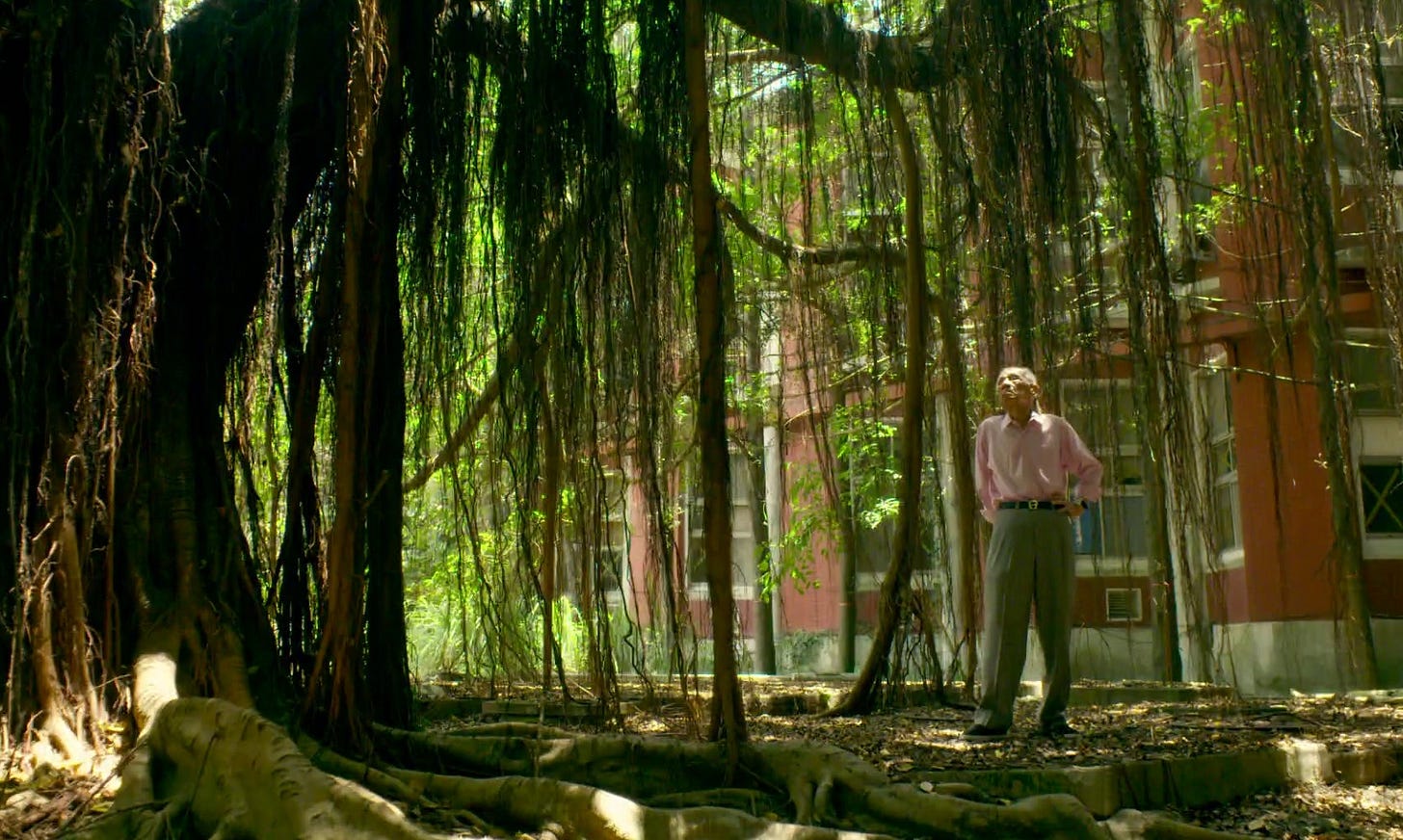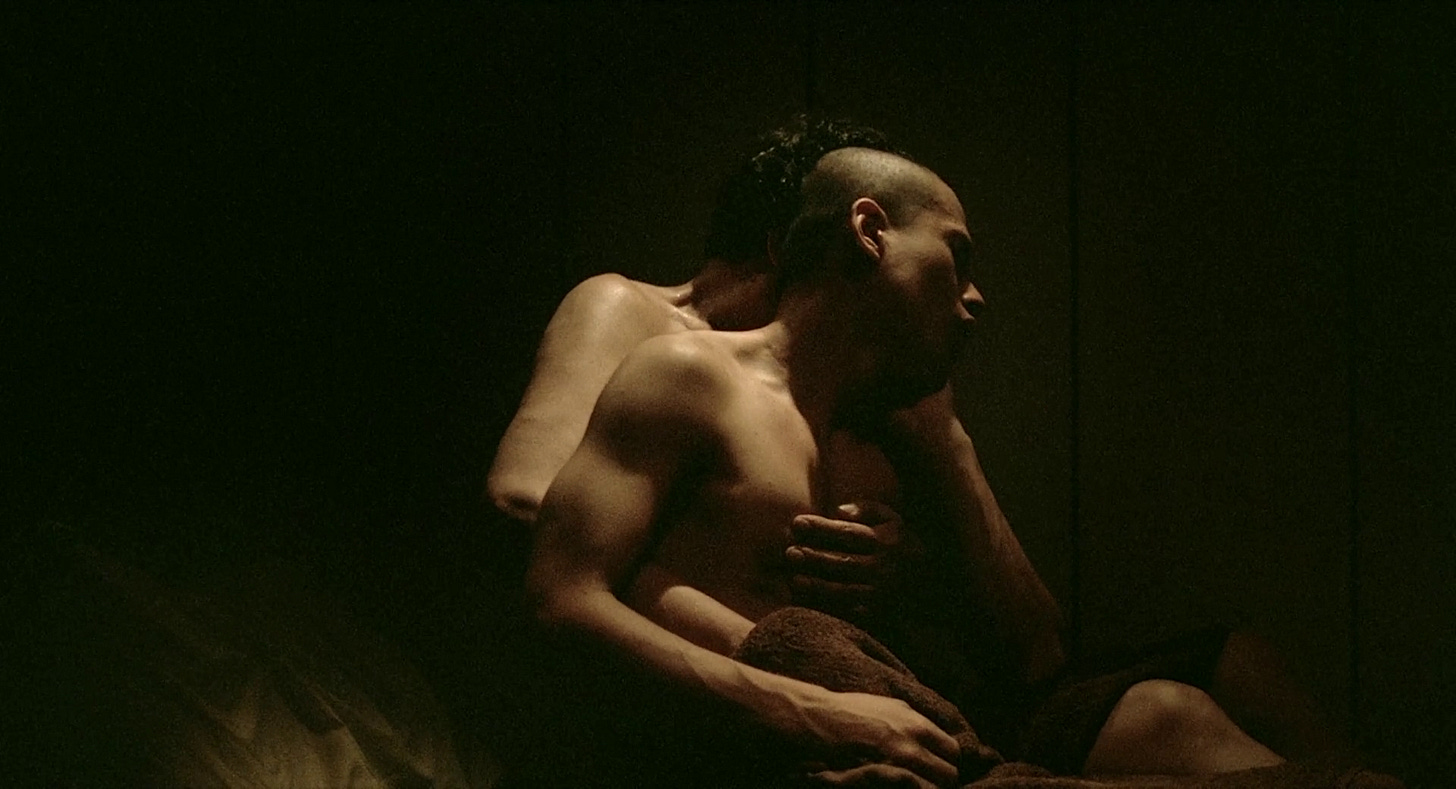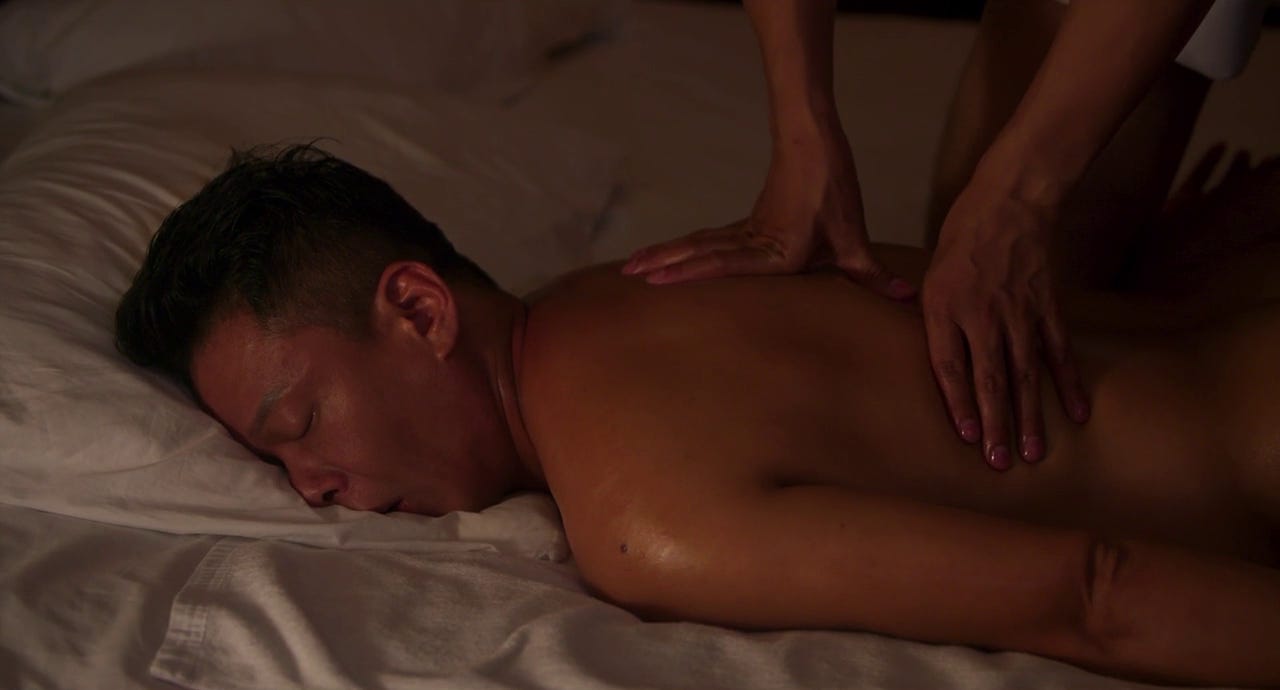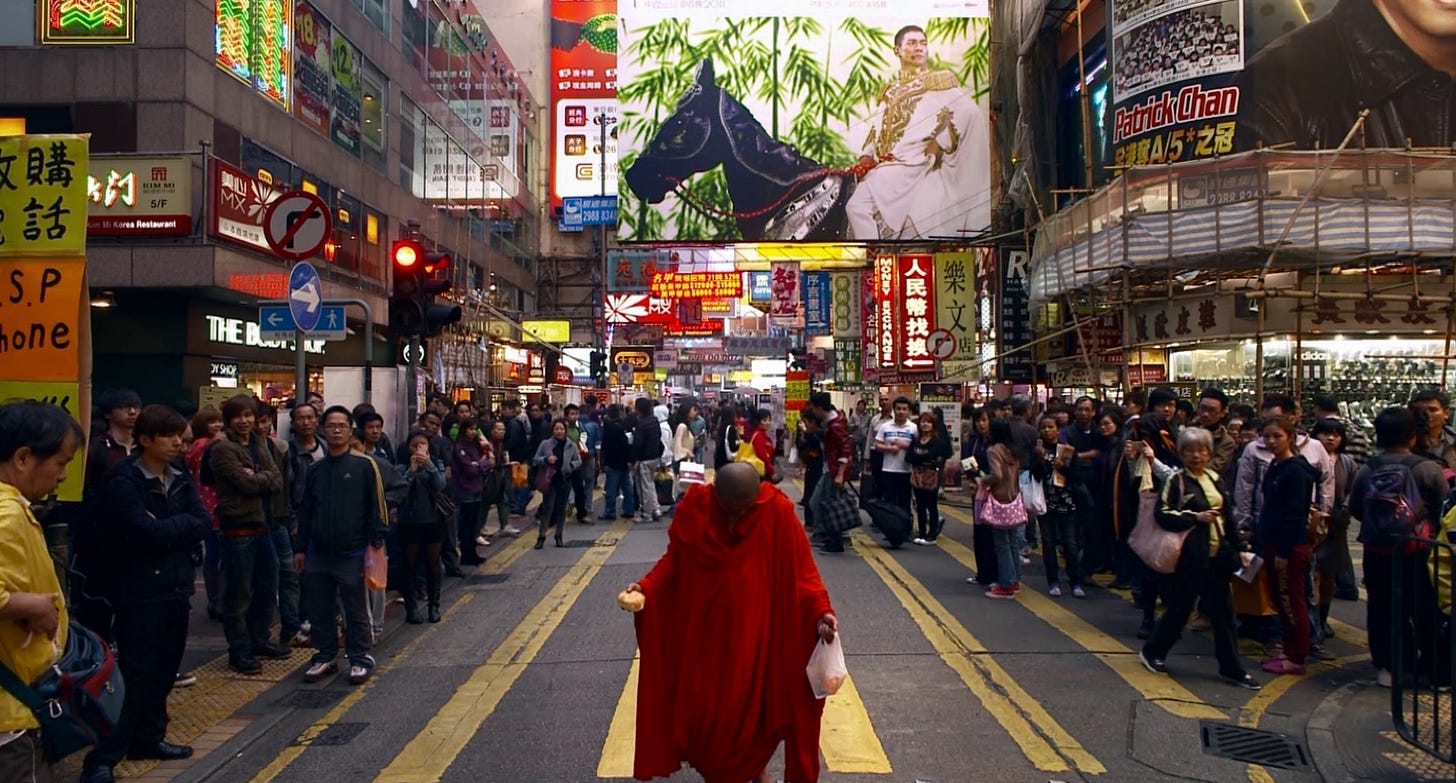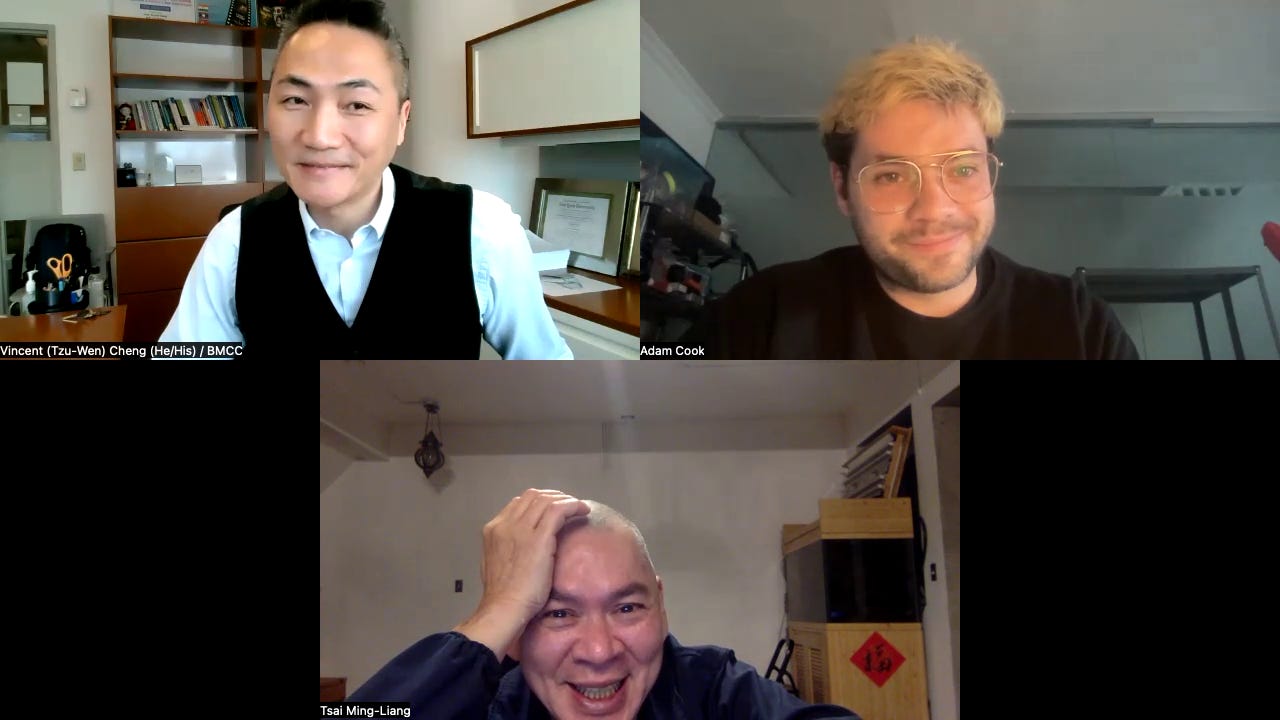Blessings: An Interview with Tsai Ming-liang
Nearly a decade since his tenth feature film Stray Dogs was declared by its director to be his swan song, Malaysian-Taiwanese artist and filmmaker Tsai Ming-liang has gone on to create a varied, exploratory, and unexpectedly prolific new chapter of his oeuvre. From short films to mid-lengths to art installations and exhibitions to theatre to virtual reality, and, recently, an (unintended) new feature, Days (which I wrote on here), in 2020, Tsai has discovered newfound inspiration and freedom working in smaller and more spontaneous modes of production spurred by commissions and the artist’s own impulses. Now removed from the intricate narrative works that earned him renown as one of the world’s most beloved and original art filmmakers, appreciation and attention have continued to grow for Tsai as the themes of loneliness and disconnection—and the uncanny recurrence of pandemic-like elements—resonate even more strongly in our present day. On the heels of a successful theatrical release of Days, amidst newly restored versions of his previous films, and the quiet 2021 premieres of three new short films that exemplify his current working method, Tsai Ming-liang joined me from his home via zoom to discuss his latest work.
Note: an unedited video version of the full interview will be available to paying subscribers next week.
Adam Cook: I have this memory from when we first met in 2014. We were walking the streets of Lisbon when you saw these birds and stopped to film them on your phone. You stood there for several minutes. I know that your recent work is partly made from footage you shoot at different times so I am wondering how often you film things like this? Is it an instinctual thing?
Tsai Ming-liang: I don't really shoot something or take pictures that often. It is so convenient to use smartphones and I rarely actually bring a camera with me. I also don't think that I'm that great at it. Someone who can operate a camera will use the cell phone as I am shooting those images. I'm not that great as a cinematographer or photographer. Sometimes, I have that impulse when I see something that's so beautiful and I really want to capture that image. Then, I will use my cell phone that I have, or very rarely, the cameras that I have. Even if I take those pictures and videos, I don't really look at them. It's just something that I do out of instinctual impulse when I see something that is beautiful and worth capturing.
But I do capture quite a lot of images of Lee Kang-sheng. We travel a lot and we are opposites when we travel: he is always sleeping, whether or not this is in a car, an airplane or train, he doesn't even pay attention to the landscape outside to enjoy the views. For him, it's just about sleeping. And for me, it's the opposite. I don't sleep when I'm traveling. So what I do other than enjoying the views is I take a lot of time to observe him as he sleeps. During these trips to different film festivals to promote films, I have a lot of opportunities to capture him, whether with a video or picture. Frequently, I actually draw him as he's sleeping.
As I said, I don't think that I'm that great a photographer and recently I tried to help him with some casting shots of him in costumes and I was blamed for them not being good enough because I made his leg so short because the angle wasn't quite right, and he had to tell me that it has to be from this low angle shot and all that. So, I'm lucky, that for me, I love images, I do have a sense of knowing what kind of images and compositions that are beautiful to me and I can rely on the cinematographer to execute those shots for me. When I look at the viewfinder, I can decipher what images I want, but personally I’m not great with a camera.
Cook: You released three new short films last year. Maybe we could talk first about Wandering. I'm curious about this idea of turning an exhibition of your work into a film.
Tsai: This particular short film came out of the exhibitions that I have been doing for the past three years along the seaside of Northern Taiwan. It shows the Walker series I have been working on for the past 10 years and it is very much about this particular space and this particular series that I want to showcase. I don't really have a specific reason or purpose for making it. At one point, I thought maybe it can be promotional footage for the exhibition, but then I didn't really use it for that. Recently, the way I think about filming is that I really want to become freer. As an artist I don't want to limit myself in terms of what kind of purpose I have to make films. Also, I am not inclined to do narrative films anymore. And the reason for that is because I do think that freeing myself from that kind of format and framework is where I am right now with my work. I would rather film something that doesn't have a beginning or ending and is just for the for the sake of it that without any specific reason to do so.
So, I just talked to an actress friend of mine, Yin Shin, and told her that she will be going to the Dune Art Museum and will be a spectator and I'm going to film the way she goes through the exhibition. In a way, I wanted to capture that moment in time and space through this particular short film. I wanted to keep it very simple. This particular exhibition might no longer be there and I just felt that there should be some kind of visual record of that moment in time and space.
Cook: Like Wandering, many of your films juxtapose your characters with the space that surrounds them, but in The Night, there are no characters whatsoever. It brings attention to different qualities of your work like light, colour and movement. Can you talk about the significance of the footage that you used and what compelled you to put it together as a film?
Tsai: The film came about around the end of 2019 when I was in Hong Kong at the height of the protests with university students protesting regulations and the changes in Hong Kong. I was invited for an art event and it was very chaotic, what was going on there. Personally, I have an affinity with the people there and with Hong Kong as a city as someone who consumed culture from Hong Kong growing up. And, as someone who is Malaysian living in Taiwan, because of that kind of diasporic experience, I have a very close connection emotionally with Hong Kong. I think that is the major reason why I wanted to capture these images not during the protests but of the remnants or the trace after the protests had happened. Also because there's also an element of danger if I got too close. I did feel a little bit conflicted as I was filming.
Luckily, the hotel where we were staying was very close to the main protest march route, which is in Causeway Bay and I just happened to have a camera with me. I took it out and started to film those traces of the marches from earlier on during the day. It’s nothing I planned, it just so happened that I thought that this will be something I can do outside of the event I was invited for. I didn't have any purpose in mind in terms of making it into a documentary or short film. All I wanted to do at that time was just to capture those images as as a way for me to show my care and my feelings towards Hong Kong, and also my sense of the sense of uncertainty I feel about the future of Hong Kong. I just wanted to use this particular experience of filming the footage that I captured to express that. You can see from the film that I do have a very strong feeling about the city through the images I captured.
Cook: With The Moon and the Tree, you follow two different people: Lee Pei-jing, who is disabled, and Chang Fang, who is elderly. Your work has always been sensitive to and interested in bodies but I wonder how you consider bodies has changed in light of aging and health?
Tsai: Indeed The Moon and the Tree has everything to do with how aging and illness have an impact on the human body. It was a commissioned piece from a foundation whose mission is to bring attention and awareness to performers after retirement.
One of the board members is actually Yang Kuei-mei from many of my films. So, I was commissioned to create a film for this purpose and I have a wealth of actors and actresses that I can choose from. I was especially drawn to Lee Pei-jing. She was my idol growing up and when she was young, she became ill and has been wheelchair bound for the past 40 years. That really creates an interesting subject for me to approach. The other person is Chang Feng who is a very well-known actor and is almost 100 years old. You can see how aging has changed his body. The corporeal reality is completely different from the images we remember from when he was young. I do think that this type of connection between the body with aging and illness is the motif of many of my films, including The River and Days. It's very much about how the body changes and evolves and morphs into something different as a result of aging and illness.
The way I approached this with Lee Pei-jing was to keep it simple. I just wanted to capture her daily life after retirement. We shot this in one morning. I approached her and asked when can film you? And she said she needed to put on her makeup and go through a process before being filmed. So I thought that why don't we just film you putting on your makeup. And not only having that part in the film, but also the way she brushes her teeth, washes her face, doing her exercises, and at the end, she sings a song. As an observer, I want to see how she deals with having these kinds of disability issues and how she performs those simple daily tasks in retirement away from the spotlight.
For Chang Feng I took a different approach. I just wanted to capture the state he's in right now as someone who, from his exterior, you can see the traces of aging very dramatically. I wanted to know how his body naturally moves in space. I directed him to walk towards this tree and then he stood there and you really see how aging has changed the way he moves and looks. I only wanted images without any type of interviews like how other documentaries might approach this, I just want to observe and see visually how aging and illness impact someone’s body.
Cook: How do you see the body in relation to the mind and the soul? Is it just a cage or are these things entwined in a more complex way?
Tsai: If I can borrow Buddhist philosophy, we as human beings are very limited. I do believe that we are predestined for the amount of food that we can consume throughout our lifetime or the amount of money that we can accumulate throughout our lifetime…I have this very fatalistic view on what we are given during our limited lifetime. So, for me, not only thinking about how we will all age and die eventually, very early on, I already thought that when I was shooting Rebels of the Neon God, I already told myself that it is so exhausting to make films, I think I'm predestined to make 10 films during my lifetime. So that's what I was aiming for.
That was the quota I thought I would be allotted as a human being on Earth during this life. And when I made Stray Dogs, that was pretty much my tenth film and I thought anything that I make after Stray Dogs will be like a bonus. So, I didn't feel as motivated to make films because anything from then on will just be a bonus. Also because I have this new journey and adventures with art museums, that completely changes the conditions of how I can do my artwork and be creative. I do feel very different about my body and I'm very sensitive to the issues and the process and the concept of aging, because I am living it. Right now with the 4K restorations they are doing of my previous films, I looked at what I made when I was younger, and I was astonished about full of energy I was and how imaginative I was, and the ways I was able to execute a lot of things I planned to do. I just no longer feel the same way about making films.
My latest narrative feature, Days was not intended, it wasn’t something I wanted to make, it just happened. I think it's a blessing or a gift from above for me to actually make this film. I do believe that for a filmmaker, when you're in your 30s you make films that will somehow reflect that reality, and when you're in your 40s you make films that will be suitable for someone who's in his or her 40s and similarly when you reach your 50s. I do think that that kind of aging process certainly changes the way you make films and what kind of films. If you're in your 50s, I don't think that you will be able to have that kind of sensibility to make films that that are designed for someone who is in their 30s. If I still make films in my 60s in my 70s I will make films with that particular perspective and make the films that can only be made by a director in their 60s and 70s, as a result of aging processes, and maybe as a result of illness—something that I think is inevitable.
Cook: Speaking of Days, it might be your purest and your gentlest film. For example, sex is not always something that's simple or pleasant in your films. But in Days, the massage sequence is very beautiful. I know you've spoken about this before and I'd actually like to contrast it with one of the most talked about scenes in all of your films, the scene of incest between the father and son in the bathhouse in The River. I realize how different these scenes are overall but I think it's interesting to consider that the scene in The River is also beautiful and sensual up until the revelation of who these two characters are. Because bodily sense is something foregrounded in your films, the viewer really relates to the experience of these sensations before we feel shocked or alarmed. Could you talk about your approach to that scene and the strategy of how we experienced the bodily sensations along with the characters and the effect that that creates?
Tsai: In both of these scenes, I'm very lucky to have the actors that I work with. They are so open minded and so committed to the performance. They freed themselves from the baggage that may be associated with sex because of the trust that they have with the scene and with me as a director. They know that they are not doing this to pander to the audience, they are doing this because it is an artistic performance that they are a part of. For The River, Miao Tien, who was a well-known actor in martial arts films, there was nothing sexual about his characters in the past, these asexual warrior characters, so sex was never a subject he was asked to perform. And I paired him with Lee Kang-sheng, a young and new actor at the time, and they have to somehow perform this very intimate, very sexual, interaction in a juxtaposition of someone who is much older and someone much younger. They trusted the scene, the storyline, the director to a point that they just went for it. And that created a kind of very beautiful, sensual moment that eventually has this incest connotation to it at the end.
I do think that can be also be seen in Days, that again, now, Lee Kang-sheng himself is that older person with the young actor, Anong Houngheuangsy who is a Laotian migrant worker in Thailand. He had many jobs before I met him, including as a massage therapist and as a sex worker to make a living. He was trained to perform the movements and techniques I filmed in Days. So I was very lucky that also in this case, the performers, while they know that this is a performance, they also know that the most important thing is to keep it as authentic, as natural, as realistic as possible. And both of them accomplish that, especially Anong because of his training, he really had the skills with these kinds of movements and gestures that are so beautiful, so well choreographed, that it actually transcends this sexual transaction into something that is a moment of pleasure, a moment of joy between these two human beings, these two human bodies. As I was filming this particular scene, I was very, very confident because of the energy I had observed and the connections that I had seen between them. And I wanted to keep this scene going for as long as possible. It ended up being 20 minutes. I know that it will move the audience not only visually, but the viewer can also feel the kind of touch of the movements, of the massage being performed on them as they watch the film.
In terms of the sex scenes I have in all my films, I do think that the best way I can describe it is that because there is this balance of the actors knowing that they are performing but wanting to keep it as authentic as possible.
Cook: I think in talking about the body, it naturally leads us to talk about time, not just because time is used in your work in such a powerful way but because the body itself has a subjective relationship to time. I think of scenes like in Stray Dogs when Lee Kang-sheng is holding the real estate sign and battling the wind which you can feel against his poncho, or the last scene of Vive l’amour with Yang Kuei-mei crying for several minutes. In Stray Dogs, if it was a short take, we would learn that this character does this thing but because it's a long take, we experience it and it embodies us maybe even in, say, his class position, and we come to know him in this different way. Or in Vive l’amour, it's not about recognizing that a character is sad, but eventually the physical act of crying, the exhaustion of it. I'm wondering if you can talk about the way you like to use the cinematic experience of time in conjunction with this foregrounding of the body.
Tsai: A lot of those things happen sort of by accident during the filming process. I can give you an example when we were shooting The River. For one shot, Miao Tien, the father character, actually woke up in the middle of the night and went to the bathroom, and we shot from the back so that we'll hear and see from the back that he's going to the bathroom. And that particular scene was so long, so unusually long, because of the long stream of pee coming out of Miao Tien. After we said “cut”, the crew just started laughed because it was so long. Miao Tien actually thought that maybe it was too long to be kept in the film. So, he was actually peeing and wasn't “acting”. He couldn't control how long it took to pee. So, when I’m trying to decide how much will be kept in the film, the most important thing is to keep it as realistic and as authentic as natural as possible, as I mentioned before. So in terms of this particular scene, this is someone's true bodily, physiological state that I just captured. In order for me to be true to it to be authentic, I need to let it play out in real time.
During screenings of this scene, a lot of people actually laugh. I don't know whether or not they laugh because they can relate to this type of bodily function or because they find it absurd. But to me, the only way I can approach the filming process as well as the editing process is to think about, if my priority is naturalism, how can I use the temporal component as an element to make this particular scene as real, as natural, as authentic as possible? A lot of time when I edit or shoot something, I think about that extra time that some people and directors might consider meaningless but to me, that is where you can get all the contextual information and a lot of the authenticity that can be manifested through the use of that extra time.
Cook: I wonder if it's different in the context of the Walker films where you're directing Lee Kang-sheng in such a deliberate way. You're kind of imposing a slowness, an invented slowness. I'm wondering if this is a different kind of idea, because for me the Walker films almost visualize time.
Tsai: For the Walker series, I do think that it really has something to do with how it started. It started as a solo theatrical performance for the stage we were invited to perform in 2011 where Lee Kang-sheng played a character that would eventually morph or transform into my father. I wanted this process to be very, very long and also very, very difficult. Lee Kang-sheng found a way to really use movement to showcase and to highlight how long the transformation will take and how difficult. His idea was using body movements in such a slow fashion that it would look like someone is walking, but it's not how people will walk. It is using movement to somehow capture the essence of time as he moves across space from one point to the other. So for me, I think that is such a beautiful way of expressing this concept. The beauty of the body movements he produced was something I didn’t want to disappear at the end of this performance. I really wanted this to be something that can be seen not only in that particular time and space but also around the world against the context of different locations, to see Lee Kang-sheng walk with different backdrops in different cities and for you to see visually how time played out in these different contexts.
Cook: Okay, one last question: what makes you happiest in life?
Tsai: [smiles then laughs] To be with people I like.
Thank you to Claude Wang for helping coordinate this interview and to Vincent (Tzu-Wen) Cheng for translating.
If you enjoy this and any other pieces, please consider supporting Long Voyage Home by becoming a paid subscriber.



